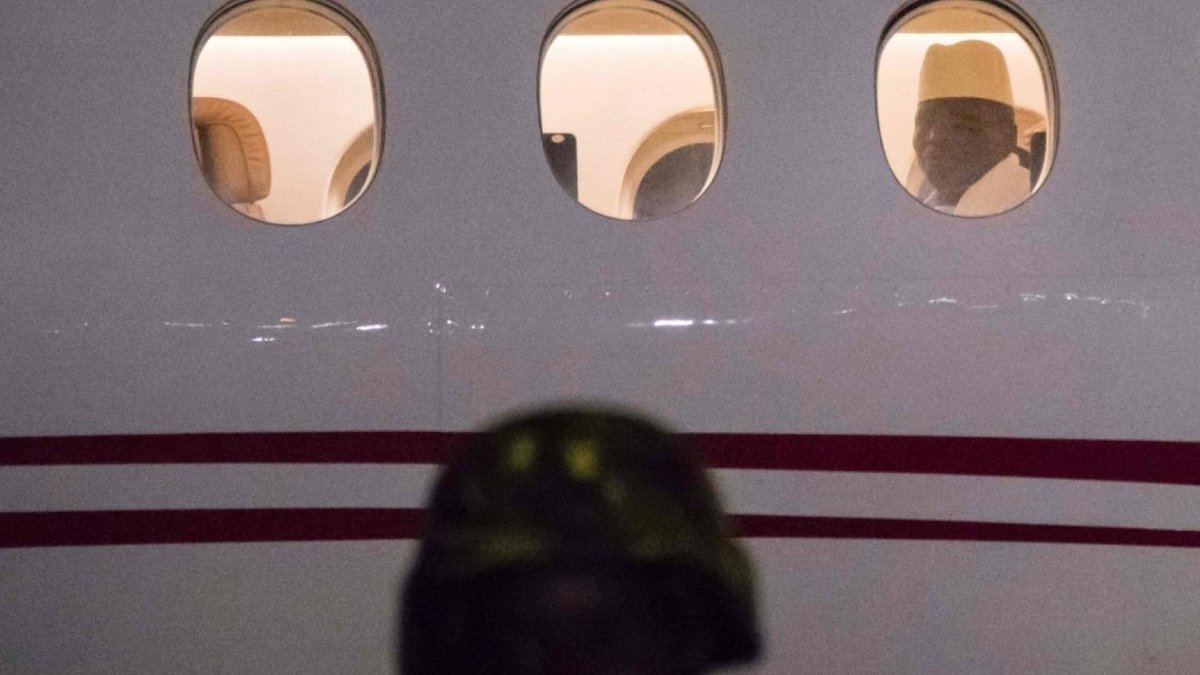
Gambians are breathing a collective sigh of relief after the departure last week of longtime dictator Yahya Jammeh. For weeks, Jammeh had refused to respect the results of a December election and cede power to the winner, businessman Adama Barrow.
Last week, the United Nations Security Council called for Jammeh to hand over power. And on Friday, troops from several West African states entered Gambian territory to force Jammeh’s hand. Apparently recognizing the inevitable, Jammeh finally left his homeland on Saturday for Equatorial Guinea, where President Teodoro Obiang Nguema has offered refuge.
Finding that landing space for Jammeh was critical to persuading him to relinquish office. And the apparent difficulty negotiators faced in identifying a country of exile — and in persuading Jammeh to accept it — reflects an important shift. Political exile, once the favored route for dictators in distress, is now harder to negotiate and less reassuring than in the past. The results may be perverse: Seeing few outside options, dictators are more inclined to cling to power — whatever the suffering they unleash.
Despotic rulers always have had financial, psychological and physical incentives to stay put. But there has also been a long tradition of rulers unwelcome at home finding shelter abroad. Under siege by political opponents in 1979, Uganda’s brutal Idi Amin fled first to Libya and then to Saudi Arabia, where he lived in gilded exile until his death in 2003. Facing spreading uprisings in 1986, Haiti’s Jean-Claude Duvalier hastily retired to France, with transport provided by the U.S. Air Force. As the “people power” movement grew, the Philippines’ Ferdinand Marcos decamped to Hawaii, clearing the way for Corazon Aquino to assume power. When the regime of Ethiopia’s Mengistu Haile Mariam collapsed, he took shelter in Zimbabwe (where he still resides today). More recently, Tunisia’s President Zine el-Abidine Ben Ali decamped for exile in Saudi Arabia after his government was toppled by his country’s 2011 revolution.
New research by academics Abel Escribà-Folch and Daniel Krcmaric provides insights into the practice of leaders fleeing abroad. They document nearly 100 examples of political exile since World War II and analyze patterns in political safe havens. Unsurprisingly, leaders favor geographically proximate countries and prefer autocratic destination states to democratic ones. But the study’s most important finding is that the practice of exile has become markedly less common. Jammeh finally found exile, but many autocrats are having trouble finding attractive exits.
The increasing reach of international justice appears to be an important reason for the shift. International or regional tribunals have sprung up to mete out justice in places such as the former Yugoslavia, Rwanda and Sierra Leone. The world’s first permanent criminal tribunal, the International Criminal Court (ICC), opened its doors in 2002 and has already pursued several former and sitting heads of state, including Ivory Coast’s Laurent Gbagbo, Sudan’s Omar Hassan al-Bashir and Kenya’s Uhuru Kenyatta.
These mechanisms mean that dictators cannot be certain that leaving power will ensure their safety. More than 120 states have joined the ICC and have a legal obligation to arrest anyone on their territory the court has indicted. Not all states honor these commitments, of course; South Africa recently allowed Sudan’s Bashir to visit. But the ICC and other tribunals introduce a worrisome complication both for those the court is investigating and for countries that might give them shelter.
Even leaders not facing immediate international indictment cannot be certain that one won’t materialize. In several cases, retired dictators who thought they had arranged safe haven discovered that they could not escape their pasts. Under heavy American pressure, Charles Taylor abandoned Liberia in 2003 to live by the sea in Nigeria. But the pressure for him to face justice before a tribunal in neighboring Sierra Leone became irresistible. Sensing his fate, Taylor bolted at the last minute, and Nigerian border guards seized him as he fled toward neighboring Cameroon. Within hours, Taylor had been transferred to the custody of the tribunal in Sierra Leone. Senegal, which gave asylum to ex-Chadian dictator Hissene Habre in 1990, finally arrested him more than two decades later. He now faces trial before a special African tribunal set up to investigate abuses during his time in power.
The complexity of arranging secure exile in the modern era has at times frustrated diplomats. When the multinational intervention against Libya’s Moammar Gaddafi bogged down, several Western leaders suggested giving the dictator an exit route. Frustrated by the intervention, Italian leaders pushed most publicly for offering refuge to Gaddafi. But no safe haven materialized. The air campaign escalated, and rebels finally killed Gaddafi as he fled Tripoli.
Efforts to arrange exile for Syria’s Bashar al-Assad fared no better. In 2012, British Prime Minister David Cameron dropped heavy hints about Assad relocating, which he said “could be arranged.” But as Escribà-Folch and Krcmaric point out, those feelers came as other leaders, including then-Secretary of State Hillary Clinton, hinted at war crimes prosecutions. How seriously Assad considered the possibility of leaving is unclear: in public, he pledged to “live in Syria and die in Syria.” Tens of thousands of Syrian deaths later, Assad’s improved military position at home and uncertain fate abroad now provide little incentive for him to leave.
The move away from official impunity is an important and welcome change. But for the people ruled by vulnerable and violent autocrats, the international turn against impunity can be a mixed blessing. International justice is often not robust enough to act as a reliable deterrent against depredations by their leaders — but it may be just enough to complicate their exits from power.
Source: Washington Post
عدد القراءات: 48





